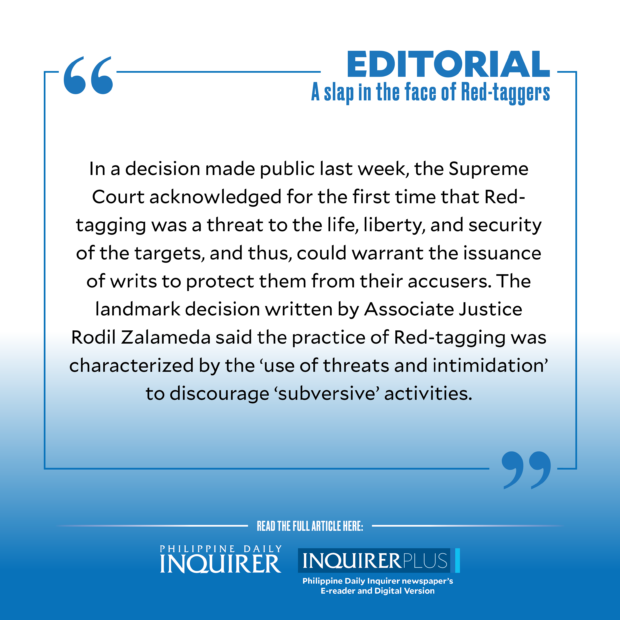A slap in the face of red-taggers

At last, the highest court of the land has spoken, and by speaking, has silenced — for now — those government agents who have carved a notoriety for “red-tagging,” a pernicious evil that has been chipping away at our democratic spaces since the last administration.
Loosely defined, the word describes the practice of labeling any activist or critic as a communist, similar to the term “red-baiting” used in other parts of the world. Any person — student or teacher, nun or priest, lawmaker or lawyer, laborer or labor leader, actor or journalist — who dares dissent against the government may be branded a rebel, a terrorist, or a sympathizer, for exercising one’s civil and political rights or espousing an undesirable ideology.
Some Red-tagged individuals have received death threats, while others have been harassed, abducted, disappeared, or outright killed, as a consequence of mere association with “Reds.”
‘Truth-tagging’
For a long time, however, rights advocates had struggled to impress on the public the dangers of Red-tagging in the absence of a clear-cut legal definition.
Some even claimed it did not exist at all, or at least, not officially. In May 2021, Assistant Solicitor General Marissa dela Cruz-Galandines said the National Task Force to End Local Communist Armed Conflict (NTF-Elcac) was only calling a spade a spade by implicating certain persons in the communist rebellion.
No, they weren’t red-tagging, she argued, but “truth-tagging.”
In an NTF-Elcac statement last January, National Security Council Assistant Director General Jonathan Malaya said there was no law or policy instrument that implemented or used the word Red-tagging. Therefore, he concluded, it “is not a crime contrary to political and ideological discourses by communist terrorist groups.”
Such an excuse won’t hold up in court anymore.
In a decision made public last week, the Supreme Court acknowledged for the first time that Red-tagging was a threat to the life, liberty, and security of the targets, and thus, could warrant the issuance of writs to protect them from their accusers.
Strong legal precedent
The landmark decision written by Associate Justice Rodil Zalameda said the practice of red-tagging was characterized by the “use of threats and intimidation” to discourage “subversive” activities. “Thus, it is easy to comprehend how a person may, in certain circumstances, develop or harbor fear that being red-tagged places his or her life or security in peril,” it said.
The ruling reversed the decision of an Iloilo court junking the petition for amparo of former Bayan Muna Rep. Siegfred Deduro against the soldiers under the Philippine Army’s 3rd Infantry Division commander, Maj. Gen. Eric Vinoya, who had identified him as a ranking member of the Communist Party of the Philippines and its armed wing, the New People’s Army.
To be clear, the high tribunal did not rule on the merits but ordered the lower court to hear and resolve the case within 10 days.
Still, the ruling was hailed by the National Union of Peoples’ Lawyers as “a strong slap on self-righteous red-taggers,” by Human Rights Watch as a decision that “acknowledges the suffering of countless victims,” and by the Commission on Human Rights as “a strong legal precedent for court cases involving red-tagging.”
For Deduro, the activist whose petition found favor in the high court, the decision refutes the NTF-Elcac’s assertion that red-tagging “is a benign exercise of ‘truth-tagging’.”
“Having said that, I still fear for my life, liberty, and security amid the continuing impunity in extrajudicial killings, enforced disappearances, and illegal arrests and detention … in our country,” he said.
‘Paradox of intolerance’
Deduro’s fears are well-founded. The challenge now falls on the Marcos administration to study the decision thoroughly and translate it into policy, from top to bottom. That means abandoning its implicit encouragement of red-tagging among civilian and military personnel, and ordering a stop to the practice across the bureaucracy.
The government, too, must consider the wisdom of reinvigorated calls to abolish the NTF-Elcac, newly neutered by the high court’s ruling. Red-taggers deserve to be disgraced and deplatformed, for contrary to the reasoning of its adherents, red-tagging is not protected speech, and freedom of expression is not a ticket to expose people to mortal harm on account of their activism or belief system.
The philosopher Karl Popper once described this moral quandary as the “paradox of intolerance”: A tolerant society that accepts intolerance will quickly turn intolerant itself.
Yes, democracy is a free marketplace of ideas, but its citizens must reject ideas that are antithetical to their own survival. For democracy to preserve itself, it must not allow red-taggers — fascists by another name — to abuse Filipinos’ cherished freedoms to advance an antidemocratic cause. Else, our nation may fall once again into the claws of tyranny.




















